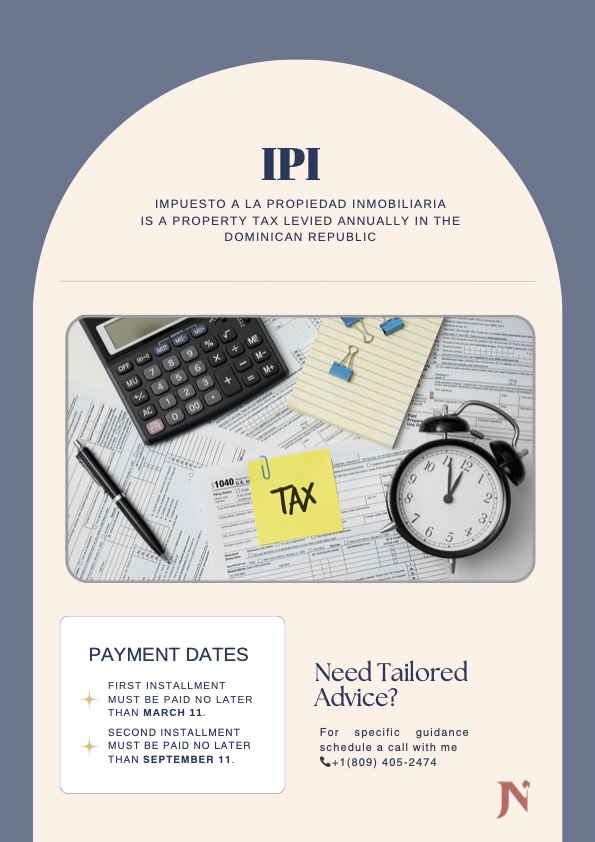
Introduction
Investing in real estate in the Dominican Republic offers exciting opportunities for foreigners looking for tropical paradises or promising investment avenues. However, navigating the nuances of local property taxes, particularly the Impuesto a la Propiedad Inmobiliaria (IPI), is crucial for making informed decisions. This comprehensive guide aims to demystify IPI for potential property owners and investors from abroad, ensuring they can invest confidently and responsibly. Understanding IPI is essential not just for maximizing investment potential, but also to make sure you fulfill your legal obligations.
What is IPI?
The Impuesto a la Propiedad Inmobiliaria (IPI) is a property tax levied annually in the Dominican Republic. As a critical aspect of the nation’s tax system, it applies to both locals and foreigners owning real estate within the country. The significance of IPI lies in its impact on the overall cost of property ownership. For foreign investors, understanding IPI is vital as it directly affects the return on investment and the fiscal responsibilities associated with property acquisition in the Dominican Republic. It’s a tax not just on the luxury estates but on a wide range of properties, making its understanding essential for a broad spectrum of investors. By comprehending the intricacies of IPI, foreign investors can better plan their investments and avoid unforeseen financial obligations.
Calculation of IPI
Calculating IPI requires understanding the Dominican Republic’s property valuation system. The tax is assessed based on the fiscal value of the property, as determined by the local tax authorities. This value often differs from the market value and is typically lower, benefiting the property owner.
The current IPI rate stands at 1% of the property’s fiscal value. However, there’s an exemption threshold to consider. Properties valued below a certain amount, which is periodically adjusted for inflation, are exempt from IPI. As of the latest update, the total value of all properties(and or land) under one’s name, if they add to a fiscal value below RD$9,146,000 are exempt from this tax (approximately equivalent to $155,000 USD). This exemption is particularly advantageous for small to medium property investors.
If your properties and land add up above this threshold, the 1% rate applies only to the amount exceeding the exemption limit. For instance, if a property is valued at USD$165,000, IPI is charged only on USD$10,000 (the amount over the exemption threshold), not the full value.
Understanding these details is crucial for foreign investors to accurately calculate their potential tax liabilities. By doing so, they can ensure their investment in the Dominican real estate market is as profitable and legally compliant as possible.
Important Dates for Payment
Staying vigilant about payment dates for IPI is crucial to avoid penalties. IPI is due annually, with the payment period typically extending from January 1st to March 11th. Property owners are expected to settle their IPI liabilities within this timeframe to remain compliant with the Dominican tax regulations.
It’s advisable for foreign investors to mark these dates prominently in their calendars or work with local property management services to ensure timely payment and avoid late payment fines.
Exemptions and Special Considerations
Understanding the exemptions and special considerations under the IPI framework is vital for effective financial planning. The most significant exemption, as mentioned earlier, applies to properties with a fiscal value below RD$7,438,197, exempting them entirely from IPI. This exemption is particularly beneficial to small-scale investors and those owning modest properties.
Additionally, there are other notable exemptions and considerations:
- First Property Exemption: If the property in question is the owner’s first property in the Dominican Republic, it may qualify for further exemptions, subject to certain conditions.
- Senior Citizen Benefits: Property owners over 65 years old are exempt from paying this tax if this is their only property. In case they have more properties they do have to pay it.
- Agricultural Land: Certain types of agricultural land may be exempt or subject to lower tax rates, promoting agricultural development.
- Tourism Incentives: Properties located in designated tourism zones may enjoy tax incentives, including IPI exemptions or reductions. For example in Punta Cana, we have CONFOTUR law up to 15 years of tax exemption.
- Exemption companies: an individual who forms a company can obtain an exemption from the IPI. Additionally, the newly established company is not required to pay the 1%rate tax
Practical Tips for Property Owners
Navigating IPI efficiently requires strategic planning and staying informed. As a real estate advisor, I can guide investors through this process, ensuring that they make the most out of their real estate investments in the Dominican Republic. Here are some practical tips:
- Seek Professional Advice: Consulting with a local tax advisor or a knowledgeable real estate agent like myself is essential for understanding specific IPI implications for your property.
- Regular Property Valuations: Keep track of your property’s fiscal value, as it can change and affect your IPI liabilities.
- Stay Informed: Keep abreast of any changes in tax laws or exemptions. As your real estate advisor, I can provide timely updates and insights into these developments.
Avoiding common pitfalls, such as missing payment deadlines or misinterpreting tax laws, is crucial. By leveraging professional advice and support, you can ensure compliance and optimize your investment.
Conclusion
In conclusion, understanding and efficiently managing the Impuesto a la Propiedad Inmobiliaria (IPI) is crucial for anyone looking to invest in real estate in the Dominican Republic. It’s not just about complying with local laws but also about maximizing the return on your investment. Remember, staying informed, seeking professional advice, and planning ahead are key to navigating the IPI landscape successfully.
For personalized advice tailored to your specific investment needs, I encourage you to contact me. Schedule a call to discuss how we can work together to navigate the complexities of IPI and ensure your real estate investment in the Dominican Republic is both successful and compliant.






